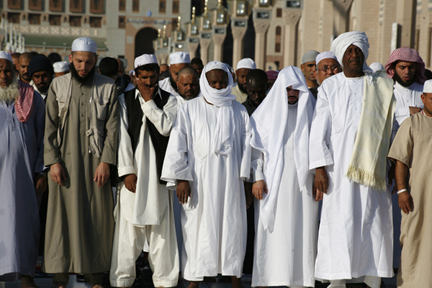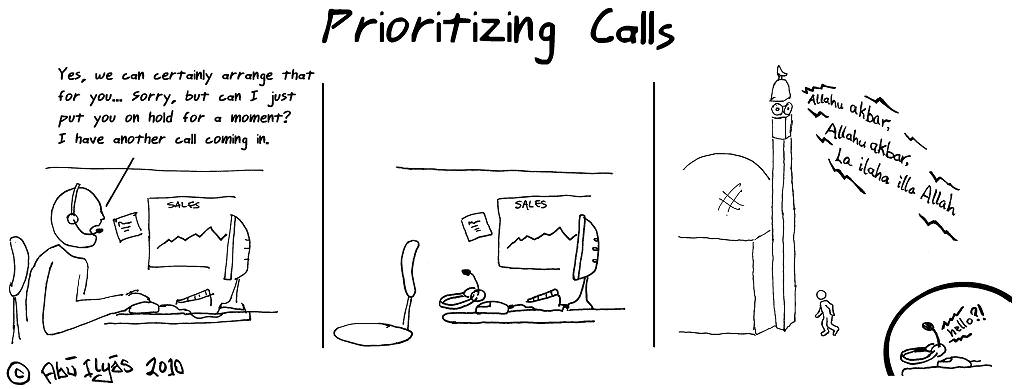When talking to students about the situation of Muslims in Europe, I compare it to a combination of widespread American disdain for the poor (i.e. welfare freeloaders), prisoners (i.e. free room and board), racism (i.e. anti-Black), immigration (anti-Hispanic and Spanish language), and fears about terrorism (i.e. Muslims in our midst). If you roll all of these fears and dislikes into one big ball you get a better idea of what is going on in Europe. That said, it is great that there was recently a debate from representatives of Muslim and anti-Muslim interests.
"
Debate: Is Europe Failing its Muslims?: "Debate: Is Europe Failing its Muslims?
Has Europe fallen into an 'us vs them' mindset? Have Europeans nurtured the perception that Islam is alien to the continent? Do they know what to make of people who don't conform to their Enlightenment values?
Or do Europeans have good reason to associate Muslims with violence? Perhaps it's opposition to fundamentalist Islam which is really anti-fascist. Perhaps Islamophobia is just a constructed model designed to protect Islam from criticism, rather than individuals from discrimination.
The debate 'Europe is failing its Muslims' took place on February 23rd at Cadogan Hall in London, in association with BBC World News and the British Council. Arguing in favour of the motion were Tariq Ramadan and Petra Stienen; against the motion were Douglas Murray and Flemming Rose.
The debate is available at
Intelligence Squared and on YouTube (
intro 1,
questions,
intro 2,
Q&A 1,
Q&A 2,
closing statements)
---------------------
The original title of the debate is not a question, it's a statement: 'Europe is failing its Muslims'. According to a pre-poll of the audience, there was a virtual tie between those supporting the motion, opposing it and undecideds. It seemed to me that the 'for' crowd was much more vocal (cheering and booing appropriately), but in the final result, the 'against' side won with 'For' supported by 37%, 'Against' by 51% and 12% undecided.
As one viewer from the floor summed up - the fact that this discussion is taking place shows Europe is not failing its Muslims.
I summarize the positions of the participants below:
Tariq Ramadan
Professor of Islamic Studies, Oxford University
The perception is that Muslims are bad and violent. That they're not European citizens. People ignore the Eastern European native Muslims. Muslims are facing class racism. They are accused of not wanting to integrate, but by being visibly Muslims, they are showing they're at home and thereby integrating.
The media doesn't talk about contributions of Muslims to their host country.
There are problems, but things are evolving. There's a silent revolution, constructive and positive changes on the grassroots level which are not seen on the political-media level.
Asked what he would say to a girl forced to wear the veil, Ramadan said he had given such a girl advice to resist her parents.
Muslims are here to stay. Muslims feel at home. They're past integration, they are now contributing. And we need to work together to change the perception and reality.
Murray to Ramadan: If you claim you are European, why do you call Muslims your 'brothers'? Ramadan: All humans are my brothers.
Petra Stienen
Former Dutch Diplomat; Human Rights Campaigner
There's lack of freedom in Muslim countries, but is it linked to Islam? What to do with Muslims who do not want to follow European norms? The one-sided debate is failing Muslims. There is true curiosity among Europeans to know more about Muslims, and not to take the Geert Wilders' stance as-is.
We're not enlightened if we only accept people who are like us. Having people who think differently and don't want to change their religion is also a universal human right. We should have compassion for others.
Douglas Murray
Director, Centre for Social Cohesion
Muslims are more violent, and they're the ones who committed terror attacks.
Western European societies managed to deal with immigration better than other places, and Muslims enjoy many more rights than they do in Muslim countries. The problem is Muslim intolerance, Muslims have let down Europe, and Islam has let down Muslims.
There is discrimination and racism, but this should not be mixed up with the right of people to voice their criticism of Islam.
The Koran might have given women advanced rights compared to 7th century Arabia, but not compared to 21st century Britain. Muslims teach hatred against other minorities, and that is not tolerable from anybody.
Flemming Rose
Danish Newspaper Jyllands-Posten
Every Muslim is first and foremost an individual, with rights and obligations. In many European Muslims communities they are not able to exercise those rights. Humans enjoy human rights, not religions. Muslims enjoy more rights in Europe than in Muslim countries. Who is failing the Muslims?
Islam is a set of ideas, not a race, and people should be able to change their minds.
There is a racism of lower expectations, people apply different standards to Muslims. By publishing the cartoons, they were saying that Muslims are European and should face the same expectations as everybody else.
Rose was asked whether he would mind if one of his children converted to Islam, but his point wasn't that people 'mind'. His children would never think they might be killed for converting. It's a shame that Ramadan wasn't asked the same question.

"







